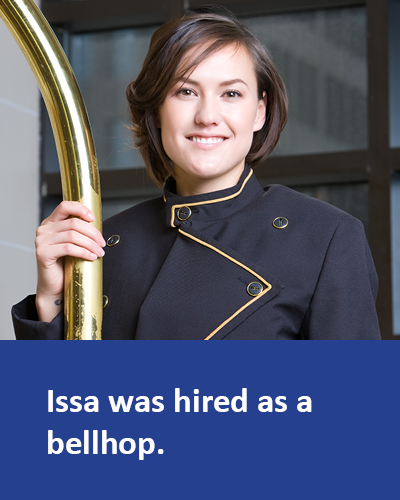Dual Jobs Rule Definitions
Note: Some states have labor laws that afford workers additional rights and protections; employers must comply with both federal and state laws.
- Direct cash wage: The “direct cash wage” is the amount paid by the employer directly to the tipped employee before taking into account tips received by the employee. The direct cash wage must be at least $2.13 an hour.
- Directly supporting work: Work performed by a tipped employee in preparation of or to otherwise assist tip-producing customer service work.
- Dual jobs: Where an employee is employed by the same employer in both a tipped occupation and in a non-tipped occupation. An employer may only take a tip credit for the work performed by the tipped employee that is part of the employee’s tipped occupation.
- Substantial amount of time: An employee has performed directly supporting work for a substantial amount of time if the directly supporting work exceeds 20 percent of the total time in a workweek for which the employer has taken a tip credit, or if the directly supporting work is performed for any continuous period of time that exceeds 30 minutes.
- Tip Credit: Employers may satisfy a portion of their minimum wage obligation to a tipped employee based on tips received by the tipped employee, provided the employer meets certain requirements. The maximum FLSA hourly tip credit an employer may take in a non-overtime workweek is $5.12 per hour, which is the difference between the direct cash wage paid, which must be no less than $2.13 per hour, and the federal minimum wage of $7.25 per hour. The employer may not take a tip credit that exceeds the amount of tips received. If the amount of tips received by a tipped employee plus direct cash wages does not equal at least $7.25 per hour worked during any workweek, the employer must make up the difference.
- Tipped employees: Employees engaged in occupations in which they customarily and regularly receive more than $30 a month in tips.
- Tip-producing work: any work performed by a tipped employee that provides service to customers for which the tipped employee receives tips.
- Work that is not part of the tipped occupation: Any work that (1) does not provide service to customers for which tipped employees receive tips and (2) does not directly support tipproducing work. An employer may not take a tip credit for any time spent performing work that is not part of the tipped occupation.
- Work that is part of tipped occupation: (1) work that produces tips, or (2) work that directly supports the tip-producing work and is not performed for a substantial amount of time.
Dual Jobs Examples

Example #1: Sofia
Meet Sofia, who works as a nail technician and works 40 hours a week (eight hours a day, five days a week) at a salon.
Tip-producing work: Sofia’s tip-producing work includes giving manicures and pedicures, and assisting her patrons to select the type of service.
Directly supporting work: Between customers, Sofia cleans pedicure baths, her tools, and the floor of the salon. Sofia performs these tasks for no more than 20 minutes at a time and for no more than five hours per week.
Question:
When can Sofia’s employer take a partial credit for the tips that Sofia receives against the payment of the full minimum wage and when must the employer pay a direct cash wage at least equal to the full minimum wage?
Answer:
Sofia’s employer can take a tip credit for all 40 hours of her 40-hour workweek, because she performs only tip-producing work and a nonsubstantial amount of directly supporting work. Sofia’s directly supporting work is not considered substantial because it does not exceed 30 minutes of continuous work or 20 percent (20% of 40 hours = 8 hours) of that part of the workweek in which Sofia is engaged in a tipped occupation. If the employer takes a tip credit, it must pay Sofia not less than $2.13 per hour in cash wages and with tips, Sofia must still make at least $7.25 per hour.

Example #3: Janet
Meet Janet, who works as a bartender and works 40 hours a week (eight hours a day, five days a week) at a pub.
Tip-producing work: Janet’s tip-producing work includes making and serving drinks, talking and serving food to customers at the bar, keeping the bar organized as she prepares drinks, and wiping down the surface of the bar where customers are sitting.
Directly supporting work: For 90 minutes after the pub closes each night, Janet slices and pits fruit for drinks for the next day’s service, wipes down the bar and tables in the bar area, cleans bar glasses, arranges bottles in the bar, retrieves liquor and supplies, cleans ice coolers and bar mats, makes drink mixes, and vacuums under the tables in the bar area.
Question:
When can Janet’s employer take a partial credit for the tips that Janet receives against the payment of the full minimum wage and when must the employer pay a direct cash wage at least equal to the full minimum wage?
Answer:
Once Janet performs more than 30 continuous minutes of non-tipped directly supporting work, she is no longer engaged in her tipped occupation. Her employer must pay her a direct cash wage equal to at least the minimum wage for the time over 30 minutes when she performs directly supporting work, therefore Janet gets paid the full minimum wage for one hour per day, five hours total per work week. Janet’s employer can take a tip credit for the remaining 35 hours of her 40-hour workweek, because she performs only tip-producing work and a nonsubstantial amount of directly supporting work during those hours. Janet’s directly supporting work is not considered substantial because it does not exceed 30 minutes of continuous work or 20 percent (20% of 35 hours = 7 hours) of that part of the workweek in which Janet is engaged in a tipped occupation.


